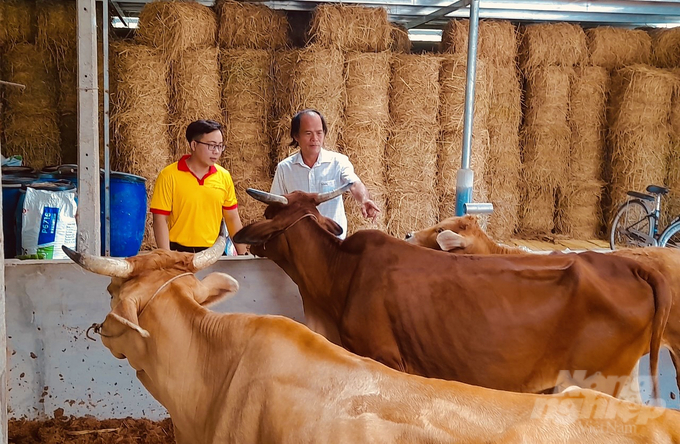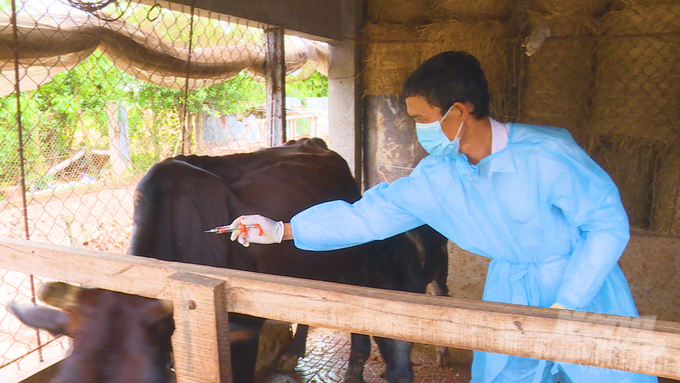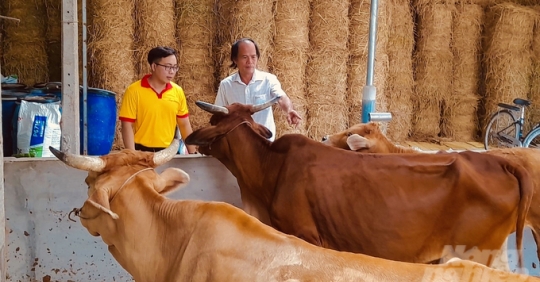
Tra Vinh farmers regularly monitor their cows and proactively vaccinate according to the instructions of the local veterinary authority. Picture: Ho Thao.
As a traditional rural occupation in Tra Vinh province, animal husbandry is evenly developed in Tra Cu, Cau Ngang, Chau Thanh, Tieu Can, Duyen Hai, Cang Long and Cau Ke districts.
Due to favorable conditions, the number of farmers’ livestock has increased significantly over the years, especially cows and goats. Tra Vinh is becoming the province with the largest herd of cows in the Mekong Delta with over 200,000 head, which is expected to reach 300,000 by 2030.
In addition to the benefits, the hot and humid weather like today is the cause of reduced livestock resilience, including common diseases in cows and goats such as foot-and-mouth disease, pasteurellosis, heat shock, ecoli …, easily causing economic damage to farmers if they is not proactively prevented.
Noting this, Ms. Thach Thi Chariya from Chau Thanh Town, Chau Thanh District, who breeds ten cows, said, “She has implemented preventive measures for cows according to the instructions of the veterinary staff.”
Accordingly, Ms. Thach Thi Chariya feeds the cows bran water three times a day when vaccinated according to the schedule announced by the veterinarian. Also sweep cow manure regularly and keep the barn clean. This ensures the health of Mrs. Chariya’s cows and their weight is increasing month by month.
According to Mr. Nguyen Huu Y from Thanh My Township, Chau Thanh District, pasteurellosis, foot-and-mouth disease and lung disease have been the most common diseases in goats during the past decade in the dry season. To protect the health of the animals, Mr. Y proactively vaccinated, made insect screens to prevent disease and kept the barn as clean as possible. As a result, Mr. Italy’s herd of goats develops stably and secures the annual profit.
“I clean the manure and rinse the bottom of the cage every three days, decontaminate and disinfect once a month and vaccinate regularly according to the veterinary schedule,” said Mr. Italy.
Veterinary officials from Tra Vinh province are vaccinating cattle across the province. Picture: Ho Thao.
The Department of Livestock and Veterinary Medicine of Tra Vinh Province recommends that in the hot season, people need to increase their number of cows and goats to eat more fresh grass, forage containing vitamin C and electrolytes to supplement nutrients for livestock. In addition, it is necessary to spray and spray disease-causing insects such as flies, mosquitoes, ticks and pupae to prevent infectious diseases according to the instructions of local veterinary authorities.
Mr. Pham Van Bao, official of Animal Husbandry and Veterinary Station of Chau Thanh District, Tra Vinh Province, said: Due to the hot weather during the day, temperatures are currently rising, which reduces the resilience of farm animals, including goats and cows, to reduce the To overcome the situation, farmers must be careful. First, farmers should give their cows and goats plenty of water to drink and limit roaming, as many animals can easily lose water when moving. Second, humans need to add vitamin C and electrolytes to balance the electrolytes in the animal’s muscles.
According to Mr. Bao, the hot season is a favorable condition for the development of a number of insects that transmit infectious diseases, such as flies, mosquitoes, ticks and pupae. pet protection. In addition to the recommended diseases, farmers must actively vaccinate cows and goats with chickenpox vaccination as soon as possible. Because when goats get smallpox, it affects both productivity and the economic performance of farmers.
“Currently, we have formed groups and teams to vaccinate 28,834 cows and approximately 2,000 goats across the county against foot-and-mouth disease and skin rash. This is to prevent the spread of disease, minimize disease-related damage to farm animals, and contribute to the stable development of farmers’ productive life,” said Mr. Bao.

